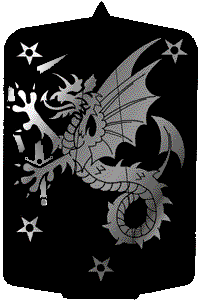![]()
 During the unsettled times following the death of Barrabas, King of Willows, a strange knight
entered the service of the ailing Count Vathek ap Gwydion, Lord of Rowan-Oak, bearing missives
from the royal court, clad in black strip-mail studded with silver stars and armed with a long slender sword
of Arcadian manufacture, its blade bearing the marks of having been broken and reforged. Sir Clay
told his business to none but the count, and after a stay of some weeks rode away to the south.
Few marked his going, for in those days many were abroad upon the trods that crossed the southlands.
During the unsettled times following the death of Barrabas, King of Willows, a strange knight
entered the service of the ailing Count Vathek ap Gwydion, Lord of Rowan-Oak, bearing missives
from the royal court, clad in black strip-mail studded with silver stars and armed with a long slender sword
of Arcadian manufacture, its blade bearing the marks of having been broken and reforged. Sir Clay
told his business to none but the count, and after a stay of some weeks rode away to the south.
Few marked his going, for in those days many were abroad upon the trods that crossed the southlands.
More astounding was Sir Clay's return four months later with a regal hunting horn adorned with silver fittings set with onyx and pearl, which he brought to the court of Rowan Oak, and laid at Count Vathek's feet. "Receive this gift, Lord, from the trove of forgotten time," said Sir Clay, and told how he had sought and found an ancient holding, long abandoned far from any trod on the cusp of the Dreaming. The horn he presented as proof of his tale, and he offered it to the count in exchange for the right to claim the freehold as his own.
It happened that the rediscovered freehold was along the very edge of those lands which Count Vathek held in vassalage to the Duchess of Rhododendrons, even where her territories abutted two other duchies. Anxious to include this new fief under his rule, Count Vathek gave his assent, and accepted Clay's fealty as Baron of Iron Mountain, and vassal to himself. Lord Clay rode off again to claim his fiefdom, and little was later heard of him. He kept to himself, inviting few fae to share his roof and accepting fewer invitations to enjoy the hospitality of neighboring lords. For thus transgressing the unspoken laws of noble society, Clay was quietly shunned by his peers. Those who remembered him, and wondered, were able to learn little.
Baron Clay retired to his den to pursue his own interests, which rumor reported to deal with the study of the stars, and of the properties of certain rare stones, and woods, and other such byways of Draocht and Greymayre. Seldom was Lord Clay seen, save when he came forth to lead the Samhain revels at the court of Rowan-Oak. Those who attended these events recalled little, save that Lord Clay ruled with a dark whimsy which nonetheless reflected and parodied the leadership which the Seelie Court had administered in the county over the foregoing year.
When Count Vathek rode out against a river-dragon's raids into his lands, he took the ancient hunting horn with him. But neither he nor it were seen again, for the serpent caught Count Vathek in its venemous jaws and dragged him under the water. A lottery was held, and Lady Rosamund named to take Count Vathek's seat, but when the lords of Rowan-Oak gathered to offer their fealty, Lord Clay was not amongst them. Nor could any be found who knew where his freehold of Iron Mountain was hidden, and the Countess could do nothing when a message arrived in the hands of a mute troll greybeard, announcing Baron Clay's sovereign claim to the barony, in defiance of Rosamund's putative suzerainty.
Dark rumors continue to leak from the south of fae benighted in the forest meeting with harrowing chimerae, bewildering fogs and strange, haunting visions. Clay is mistrusted and avoided most, and those who go to bring him before Countess Roasamund's judgement seldom return sane, and never succesful. All who have met Lord Clay speak of his overweening hauteur and melodious, insinuating voice. Folklore casts him as a hermit sorcerer, spinning unfathomable intrigues and deceits from his mysterious lair.
Clay is tall and lean, his features archly aquiline, his hair dark and his eyes cold. He is said to favor voile of dark, rich fabric and voluminous cut, over his knightly black strip mail. None have knowingly seen him in mortal mien, and his identity in the mortal world, if indeed he has one, is unknown.
![]()
| Back to Profiles Page, Nobility Page or to Main Page |
|---|